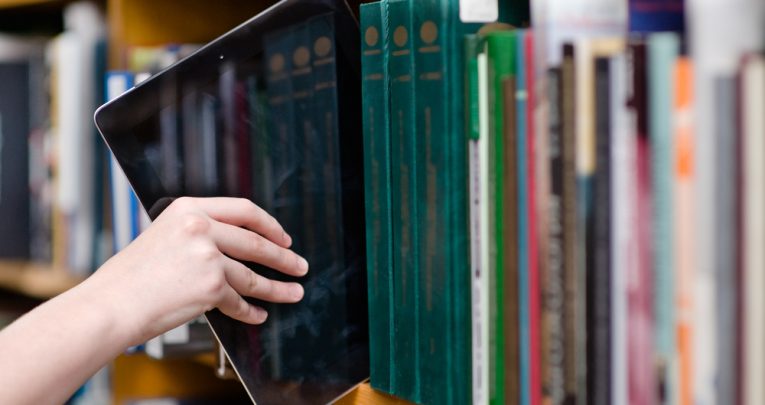Which Is Better – Textbooks Or Technology?

Among the topics under debate at year's Battle of Ideas is the question of whether textbooks have been superseded by technology. Here, Harley Richardson weighs up the arguments of both sides…

When’s the last time you used a textbook in a lesson?
In the UK, traditional paper textbooks have fallen out of fashion, with online resources, lesson plans and worksheets arriving to take their place. The influential 2014 Cambridge Assessment policy paper ‘Why Textbooks Count‘ [PDF] found that just 10% of students’ teachers in England used textbooks as the basis for maths lessons; in Finland, the figure was 95%, with similar patterns occurring across other subjects.
Why did textbooks fall from favour? Nick Gibb, Minister for School Standards seems to believe the issue is an ideological one, having previously claimed that an ‘anti-textbook’ ethos has taken hold in teacher training institutions and academia and spread from there to the classroom.
Yet in recent years we’ve seen something of a backlash and calls for a return to more traditional teaching resources. The same aforementioned policy paper examined education systems in countries including Singapore, America and Hong Kong, and concluded that physical textbooks are, in fact, an important component of a good education. Nick Gibb endorsed the report’s findings, and argued that our reluctance to use textbooks has left pupils lagging behind their peers in top performing nations.
But when technology has made such a positive impact on so many areas of our lives, why should schools be an exception? Aren’t textbook advocates just stuck in the past, blind to the transformative potential of digital resources?
A better reflection of the world?
Richard Culatta, who until recently was an education advisor to Barack Obama, believes so, arguing that textbooks are, “Out of date the second they get printed,” and that they encourage a ‘linear’ form of learning at odds that’s at odds with recent education research.
Technology advocates argue that the dynamic, open-ended and interlinked nature of digital resources provide a better reflection of the way we understand the world. Online technology allows children to take a more active role in their education, they say, by enabling them to interact with resources that can be personalised to accommodate the skills and experience of each individual. Pupils are able to follow their own interests and explore the world of knowledge for themselves, instead of being pushed along rigid and arbitrary divisions between subjects.
With pupil engagement a big concern these days, teachers often report that video is a great way to gain the attention of their class. Novelty is a factor, of course – but aren’t images often a more effective medium for transmitting information than text? There’s a reason why we say a picture is worth a thousand words.
Convenience is also important. Mobile phones and tablets can hold vast amounts of information and are far less likely to give you backache than a stack of textbooks. Digital resources can be accessed at school, at home, or on the move, and are popular with schools experimenting with flipped learning. They also appeal to the environmentally-minded, since there’s no paper involved.
Technological tempations
But not everyone is comfortable with the increasing presence of technology in schools. Parents often air concerns that their children already spend too much time staring at screens and are in danger of cutting themselves off from the world. Famously, some of Silicon Valley’s most notable millionaires are known to limit their children’s access to technology.
There are also concerns about the impact on behaviour. Tom Bennett, chair of the Department for Education’s Behaviour group, has said, “Technology is transforming society and even classrooms – but all too often we hear of lessons being disrupted by the temptation of the smartphone.”
Are children really turned off by books, or it actually adults who are ambivalent about printed text? After sales of ebooks fell over the past year, Penguin stated that it had been too hasty to assume a shift from paper to digital books. Joanna Prior, managing director of Penguin’s general books, recently commented that, “We somehow lost confidence in the power of the word on the page, which was a bad moment.”
Time to take stock
After more than two decades of digital technology in the classroom, now is a great time to take stock of what we’ve learned. All the questions above, and more besides, will be explored next Sunday in ‘Teaching to the text: textbooks or technology?’ – a debate taking place at the Barbican as part of the annual Battle of Ideas festival. Among the speakers will be Tim Oates, author of ‘Why Textbooks Count’; Colin Hughes, managing director of Collins Learning; José Picardo, assistant principal of Surbiton High School; David Perks, principal of the East London Science School; and Susanna Goldschmidt, Head of Publishing at Discovery Education.
‘Teaching to the text’ will kick off a whole day of education debates at the Battle of Ideas, on topics ranging from the role of religious education in a secular age and school rules, to behaviour, the notion of a ‘white male’ curriculum, and the rise of ‘generation snowflake’ (easily offended students). Come along and have your say.
Harley Richardson is director of design and development at Discovery Education and a committee member of the Institute of Ideas Education Forum
The ‘Teaching to the text: textbooks or technology?’ debate will take place between 10.00 and 11.30am on Sunday 23rd October at the Battle of Ideas. The festival itself runs from Saturday 22nd to Sunday 23rd October at London’s Barbican Centre; for more information and details of how to attend, visit www.battleofideas.org.uk or follow @instofideas











